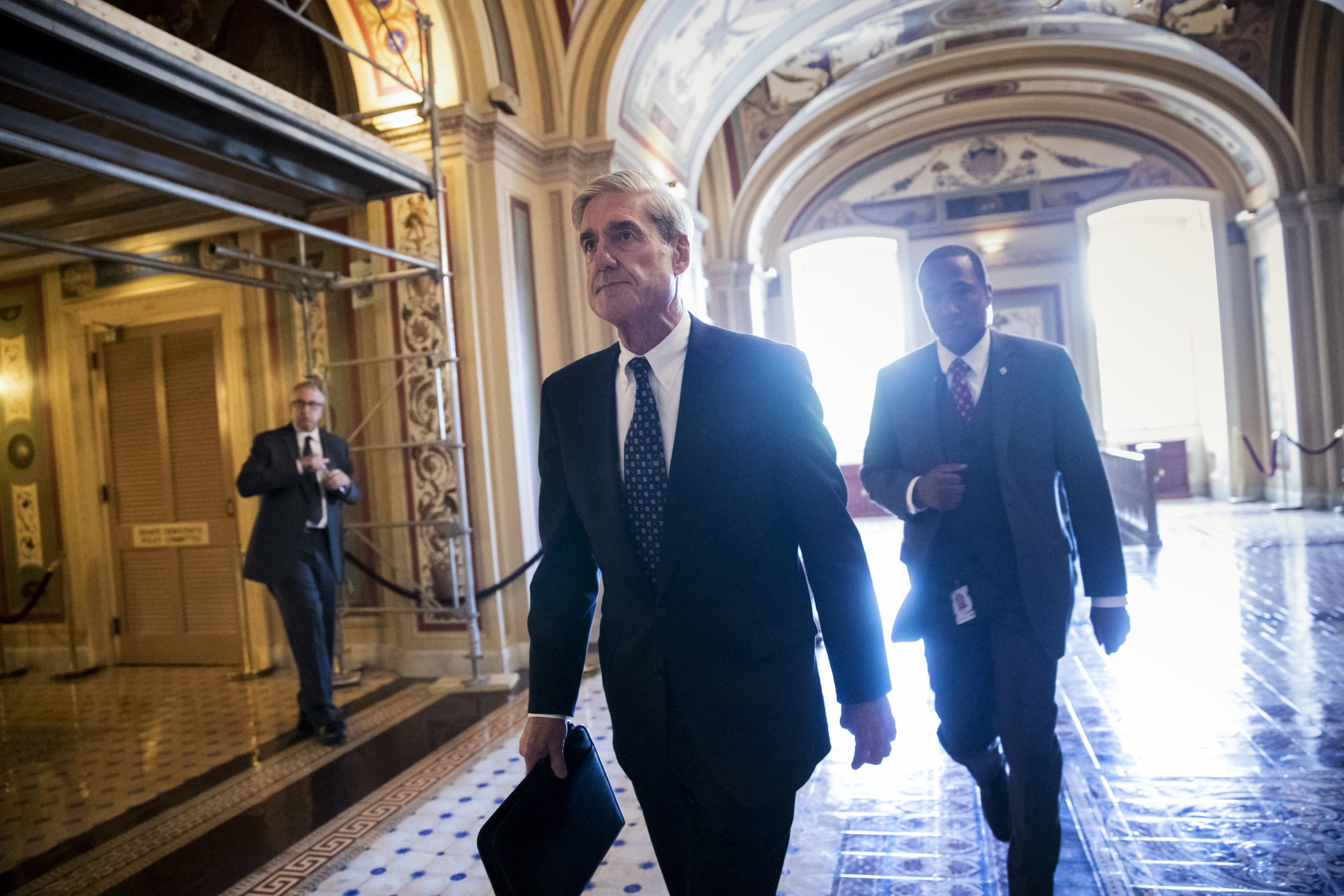
Despite intense debate about the scope of Special Counsel Robert Mueller's investigation, there is broad agreement that "collusion" with the Russian government is at the heart of it. Yet that term, which is used on a daily basis on cable news, has no legal meaning. Mueller's recent moves—from subpoenaing Paul Manafort's financial records to working with a Ukrainian hacker—make more sense if you understand how working with the Russians can be a crime.
As a legal matter, what's significant is whether an American "conspired" with a representative of the Russian government. Conspiracy is just a legal term that means an agreement to commit a crime. An American can also commit a crime by "aiding and abetting" a criminal act committed by someone else. That means that the American knew of the criminal activity and helped make it succeed. It is also a federal crime to actively conceal a felony, even after the crime has already been committed.
The common thread underlying all of these things is that the American has to know that a crime has been committed and somehow assist in committing or concealing it. Merely working with the Russians, receiving aid from the Russians or meeting with the Russians is not enough.
So what underlying crime could Mueller be investigating? One obvious possibility is hacking the Democratic National Committee and subsequently releasing emails from it via WikiLeaks. Hacking U.S. servers is a crime that is frequently investigated and prosecuted—I handled some of those cases myself. Anyone who agreed to take part in an effort to hack the DNC's servers committed a crime.
Related: Will Mueller's probe spiral into disaster?
An American could join a Russian conspiracy to hack U.S. servers without ever speaking to the hackers, as long as they knew about the criminal activity and agreed to play a role in it. Conspirators don't have to know everyone or everything involved a plot—once you join a conspiracy, you're "all in" and are liable for all foreseeable acts of the other conspirators.
For example, an American who knew about a hacking operation and agreed to distribute or use stolen material could join a conspiracy without knowing the hackers or how the hacking took place. That person could also be charged with abetting the hacking if distributing the stolen material aided in the crime.
That explains why a recent New York Times report that a Ukrainian hacker is helping the FBI with the Russia probe could be important. In order to charge anyone with a crime connected with the Russian hacking, Mueller will first need to prove that the hacking occurred. The testimony of the hacker could establish that the crime occurred, who was responsible for it and how it happened.
The more difficult thing for Mueller to prove is whether an American knowingly joined a Russian criminal conspiracy or aided in one. That's why recent reports that Mueller is focused on Donald Trump Jr.'s meeting with a Russian lawyer is unsurprising, given the emails Trump Jr. released establish that he knew Moscow wanted to help his father's campaign and he welcomed the assistance.
As I told The New York Times, that email string is not sufficient to prove that Trump Jr. joined a conspiracy. Again, Mueller needs to prove that Trump Jr. helped commit a crime or agreed to do so.
There are other unrelated criminal acts that Mueller could seek to prove in relation to that meeting. For example, it is a federal crime to receive material that you know is stolen, as long as it is worth more than $5,000 and it crosses state or international boundaries before you receive it. It is also a crime to offer to trade an official act, like reducing sanctions, in exchange for something of value.
Another crime is receiving a "contribution" from a foreign national. But as I told The Daily Beast, violating federal campaign law is not a crime unless it is done "knowingly" and "willfully." That could be difficult to prove in the case of Trump Jr., although perhaps not for Manafort, who has a lot of campaign experience. Indeed, Mueller could establish Manafort's state of mind regarding meetings with the Russians. As The Washington Post reported, the GOP operative rejected potential meetings with Moscow in emails that he sent before the Trump Jr. incident. In those emails, retired Admiral Charles Kubic raised concerns that a meeting could expose attendees to legal liability. A juror could conclude that such a correspondence show that Manafort was aware of the legal risks associated with the Trump Jr. meeting before he attended it.
Expect Mueller to interview everyone who attended the meeting and review all communications surrounding it. His primary purpose would be to understand what, if anything, came from it and whether there were subsequent and related talks between the Trump campaign and people who claim to represent the Russian government.
One thing we can be sure about is that Mueller's inquiry will last many months. The recent suggestion by White House special counsel Ty Cobb that it should wrap up by Thanksgiving is disingenuous. Any lawyer with extensive experience with federal criminal investigations—and Cobb does—knows that a complex probe like this one could take years to complete.
Renato Mariotti was a federal prosecutor in Chicago for more than nine years, prosecuting many complex financial crimes and obstruction of justice cases.
Uncommon Knowledge
Newsweek is committed to challenging conventional wisdom and finding connections in the search for common ground.
Newsweek is committed to challenging conventional wisdom and finding connections in the search for common ground.
About the writer
To read how Newsweek uses AI as a newsroom tool, Click here.








